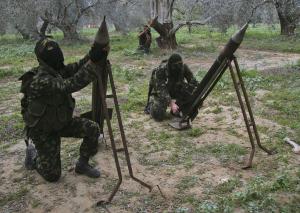AP ANALYSIS: Old story, new twists in Gaza war
Then as now, a
question persists: Beyond the carnage, are Israel's airstrikes against
civilian locations achieving anything at all?
It
ended messily for Israel in 2009. A U.N. commission investigated,
Israel refused to cooperate, and the resulting report — since then
partly disavowed by its own author, former South African judge Richard
Goldstone — said Israel deliberately targeted civilians and might have
committed war crimes, along with Hamas.
About
1,400 Palestinians, including many hundreds of civilians, were killed
in the operation dubbed "Cast Lead," along with 13 Israelis. After 18
days this year, the civilian death toll of operation "Protective Edge"
is at similar levels — and the proportion is higher. Israel's argument
is similar as well: Hamas is to blame not only for attacking a
much-stronger power with rockets, but also for operating from within
heavily populated residential areas, as well as mosques, hospitals and
schools.
Navi Pillay, the
U.N. high commissioner for human rights, said Wednesday that some of the
recent Israeli attacks, including those on homes and on a care center
for the disabled, raise "a strong possibility that international law has
been violated in a manner that could amount to war crimes."
She
also condemned indiscriminate Hamas attacks — including 3,000 rockets
fired since July 8 that have killed several civilians in Israel — and
said storing military equipment in civilian areas or launching attacks
from there is unacceptable. But "the actions of one party do not absolve
the other party of the need to respect its obligations under
international law," she added.International law can be a fuzzy and subjective thing, its application dependent on circumstances. The wider context also affects the degree of political pressure on Israel to stop. So it is important to note that there are also key differences between now and 2009. Here's a comparative look:
.
THE ROCKETS HAVE MORE RANGE
It
is hard for outsiders to grasp the meaning, to Israelis, of Tel Aviv.
The seaside metropolis of about 2 million is prosperous and fun, and an
easy, generally liberal atmosphere prevails. It is a place of high tech,
of electric nightlife, of diverse and highly Westernized culture, of
surfing and gay pride parades. It is essential to an often unspoken but
profound feeling that many Israelis cling to, which oddly aligns with
what Arab critics would say: That they somehow do not belong in the
Middle East.
In 2009, Hamas was firing relatively small
projectiles with minimal range, mostly aimed at border communities
surrounding the blockaded Gaza Strip. These are gritty places:
hardscrabble towns that are relatively poor; or kibbutz farming
communities whose people are often idealistic and pioneering. The people
under fire there were certainly displeased, but by and large had no
illusions about where they live.Now Hamas is firing at Tel Aviv, which is 80 kilometers (50 miles) north of the strip, and even at some cities beyond. One landed near Tel Aviv's airport, causing U.S. and European airlines to suspend flights. Millions are living with the threat of rockets every day. Prime Minister Benjamin Netanyahu can go on TV and ask Americans what they would do if New York or Chicago were under constant rocket attack. The argument resonates, the world seems to be listening, and even many in the Arab world agree. So Israel gets more room to maneuver.
IT'S NOT THE SAME HAMAS
Hamas rode relatively high in 2009, in its own particular way.
The
Islamic militant group had legitimately won Palestinian parliamentary
elections in 2006, was denied the share of power it wanted by
Palestinian president Mahmoud Abbas, and in a little over a year had
battled its way to full control of Gaza. It promised cleaner government
than the Palestinian Authority and was relatively popular as a result.
Israelis and much of the world, remembering suicide bombings and bus
attacks, rejected Hamas as a terrorist group, to be blockaded and
shunned. But in the Arab world at least, there was a veneer of
legitimacy. Hamas had powerful supporters in Iran and the Gulf, and
neighboring Egypt was not openly an enemy back then.
Much
has happened since in the Arab world, and it hasn't helped Hamas. The
Arab Spring brought a wave of Islamist successes, following by a
widespread sense of their misrule. In Egypt, the Muslim Brotherhood,
which largely spawned Hamas, is now outlawed; its leaders are on trial
and the group is portrayed by media as terrorists. Jihadis cut from a
similar cloth as Hamas are considered in leading Arab circles to have
brought destruction and disgrace in Syria, Iraq, Libya, Yemen and
Egypt's own Sinai region.
There
is not much love for Israel in the Arab world, and growing horror at
the civilian deaths in Gaza. But many in the region seem nonetheless
pleased to see Hamas get hammered, and some would be happier still to
see it gone. The Obama administration seems more involved in the region
than that of President George W. Bush in its final days: Secretary of
State John Kerry and other international negotiators are scrambling
around the Middle East, but genuine pressure seems lacking. More
maneuvering room for Israel.
NETANYAHU IS NO OLMERTThere are two kinds of governments in Israel when it comes to the heart of the matter, which is peace with the Palestinians and the possibility of a Palestinian state.
One
kind was in power during "Cast Lead." Prime Minister Ehud Olmert was
clearly committed to pulling out of the West Bank one way or another and
was making rather far-reaching offers to Abbas: a state in all of Gaza
and the vast majority of the West Bank, and a share in Jerusalem. For a
variety of reasons no deal was struck, but Olmert was perceived as
serious on the Palestinian issue. This opens doors and spreads
positivity, and Israel enjoyed some space as a result.
It's a very
different story under Netanyahu. He dropped his lifelong opposition to a
Palestinian state in recent years — but his terms are very far from
those of the Palestinians. Jewish settlement construction in the West
Bank is roaring ahead, and nine months of peace talks got scarcely
beyond quibbles and procedure. Netanyahu's own party continues to oppose
a Palestinian state, and there is a sense of a wink about his moves in
this regard. And so the region and the world view him with considerable
suspicion. If he were fighting anyone but Hamas, the atmosphere for
Israel would be most uncomfortable by now..
A SENSE OF PREDICTABLE FUTILITY
During
the 2008-9 campaign, it was not exactly clear what the outcome would
be. Would Hamas break under the assault? Would the people of Gaza blame
Hamas for their suffering and overthrow the group? Is victory possible?
It was not even clear whether Israel ruled out reoccupying the strip,
from which it had withdrawn four years earlier.
The
answers to those questions are clearer now. In both campaigns, as well
as another one in late 2012, Hamas has shown that it will simply
continue firing rockets no matter what the outcome to the people of
Gaza. Hamas does not seem on the verge of being overthrown despite its
heavy-handed rule. And the people actually support Hamas' stated goal of
ending the Israeli-Egyptian blockade so much that there seems to be
scant pressure on Hamas to give in. On the Israeli side, there is
minimal desire to retake the inhospitable strip.
It's
also clear that Israel's various efforts to minimize the deaths with a
variety of warnings aren't working well. For the third time, the world
sees images of whole families buried under rubble, of children in a
morgue. And for all its claims of precision, Israel's military is having
trouble producing detailed explanations of why any particular building
was hit.
It lends a sense of
predictable futility to the proceedings, and raises questions in Israel
itself about the strategy. The answer tends to be that doing nothing in
response to rocket fire on cities is not an option. That logic dominates
the Israeli discourse for now. But to many, it is starting to feel
uncomfortable nonetheless.
___
Dan
Perry has covered the Middle East since the 1990s and currently leads
Associated Press' text coverage in the region. Follow him on Twitter at
www.twitter.com/perry_dan.






No comments:
Post a Comment